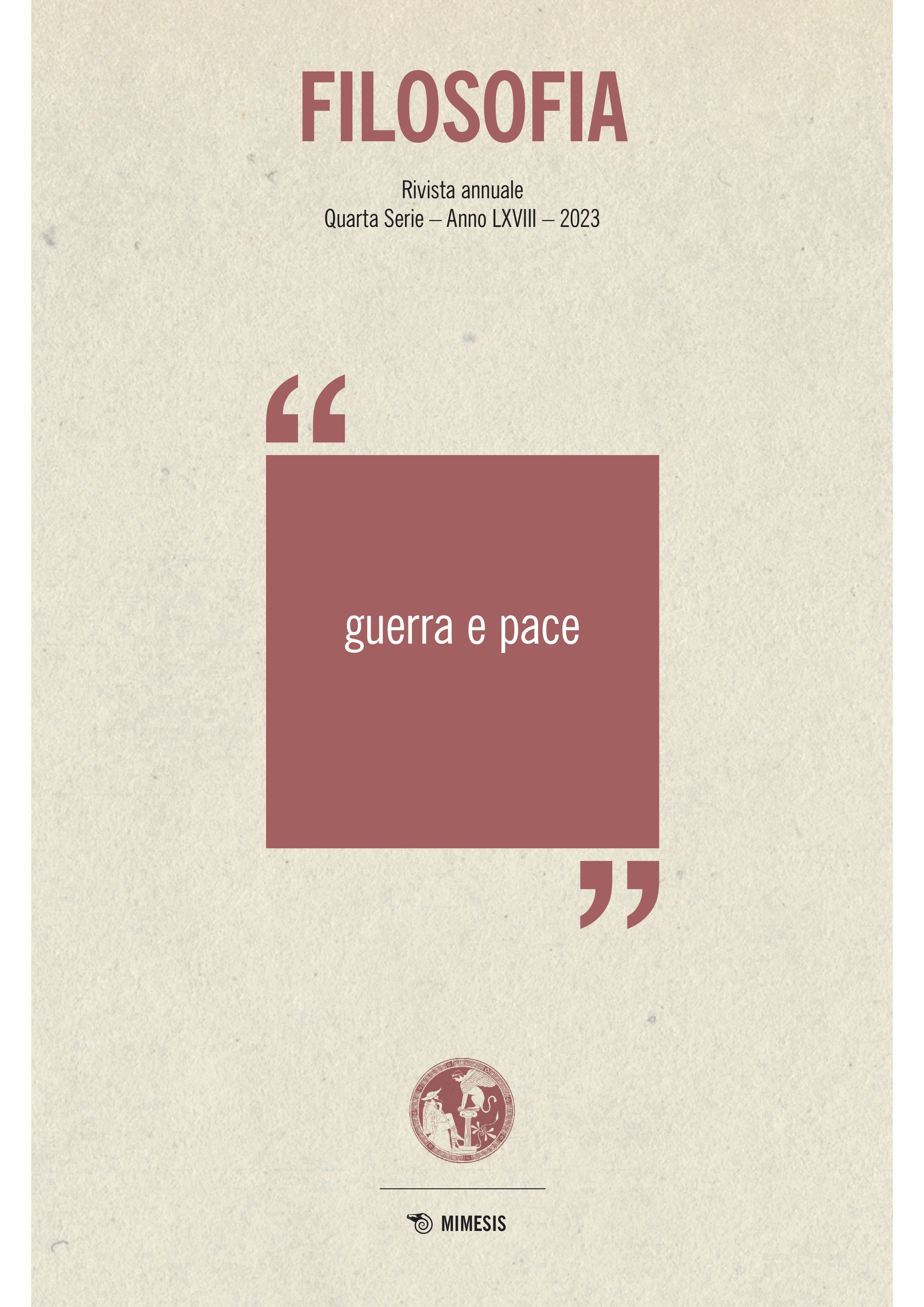Economic Sanctions, well-being, and the duty to trade
DOI:
https://doi.org/10.13135/2704-8195/9217Keywords:
prima facie duties, survival, self-realization, indispensability, stateAbstract
In this paper I would argue that, in the context of the ethics of economic sanctions, there is a duty to trade, and that duty is grounded in the practical and instrumental indispensability of trading for well-being of the people of the states. I understand well-being as the optimal conditions for survival and self-realization that states must warrant to people. I will answer the arguments against a duty to trade, as well as the arguments for a duty not to trade in those cases where the parties to the trade are dictatorships. I will develop my argument based on the metaethical argument about deliberative indispensability in favor of moral facts, developed by David Enoch, and raise an analogy with practical indispensability. The way of states to promote well-being is by trading. If trade is essential for survival, states have a strong prima facie duty to trade. If trade is not essential for survival, but nonetheless it is important for well-being, then states have a weak prima facie duty to trade.
Downloads
References
Alkire, Sabina. 2002. Valuing Freedoms: Sen’s Capability Approach and Poverty Reduction. Oxford: Oxford University Press.
Alkire, Sabina, and Rufus Black. 1997. “A Practical Reasoning Theory of Development Ethics: Furthering the Capabilities Approach”. Journal of International Development 9, n. 2: 263- 279. https://doi.org/10.1002/(sici)1099-1328(199703)9:2<263::aid-jid439>3.3.co;2-4.
Berkowitz, Daniel, Moenius Johannes, and Katharina Pistor. 2006. “Trade, Law, and Product Complexity”. The Review of Economics and Statistics 88, n. 2: 363-73. https://doi.org/10.1162/ rest.88.2.363.
Comim, Flavio, Mozaffar Qizilbash, and Sabina Alkire. 2008. The Capability Approach: Concepts, Measures and Applications. Cambridge: Cambridge University Press.
Crowe, Jonathan. 2019. Natural Law and the Nature of Law. New York: Cambridge University Press.
Cuneo, Terence. 2007. The Normative Web. Oxford: Oxford University Press.
Early, Bryan R., and Marcus Schulzke. 2019. “Still Unjust, Just in Different Ways: How Targeted Sanctions Fall Short of Just War Theory’s Principles”. International Studies Review 21, n. 1: 57-80. https://doi.org/10.1093/isr/viy012.
Ellis, Elizabeth. 2021. “The Ethics of Economic Sanctions: Why Just War Theory Is Not the Answer”. Res Publica 27, n. 3: 409-26. https://doi.org/10.1007/s11158-020-09483-z.
Enoch, David. 2011. Taking Morality Seriously. A Defense of Robust Realism. Oxford: Oxford University Press.
Escribà-Folch, Abel, and Joseph Wright. 2015. Foreign Pressure and the Politics of Autocratic Survival. Oxford: Oxford University Press.
Finnis, John. 1980. Natural Law and Natural Rights. Oxford: Clarendon Press.
Gordon, Joy. 1999. “A Peaceful, Silent, Deadly Remedy: The Ethics of Economic Sanctions”. Ethics & International Affairs 13: 123-42. https://doi.org/10.1111/j.1747-7093.1999.tb00330.x.
Gordon, Joy. 2011. “Smart Sanctions Revisited”. Ethics & International Affairs 25, n. 3: 315-35. https://doi.org/10.1017/S0892679411000323.
Hurka, Thomas. 1993. Perfectionism. Oxford: Oxford University Press.
Julio, Brandon, y Youngsuk Yook. 2013. “Policy Uncertainty, Irreversibility, and Cross-Border Flows of Capital”. SSRN Scholarly Paper 2013-64. https://doi.org/10.2139/ssrn.2350872.
Murphy, Mark C. 2001. Natural Law and Practical Rationality. Cambridge: Cambridge University Press.
Murphy, Mark C. 2006. Natural Law in Jurisprudence and Politics. Cambridge: Cambridge University Press.
Nili, Shmuel. 2016. “Rethinking Economic ‘Sanctions’”. International Studies Review, marzo, viv008. https://doi.org/10.1093/isr/viv008.
Nozick, Robert. 2013. Anarchy, State, and Utopia. New York: Basic Books.
Partridge, Mark D., Rickman Dan S., Olfert M. Rose, and Ying Tan. 2017. “International trade and local labor markets: Do foreign and domestic shocks affect regions differently?”. Journal of Economic Geography 17, n. 2: 375-409. https://doi.org/10.1093/jeg/lbw006.
Pattison, James. 2018. The Alternatives to War. From Sanctions to Nonviolence. Oxford: Oxford University Press.
Peksen, Dursun. 2009. “Better or Worse? The Effect of Economic Sanctions on Human Rights”. Journal of Peace Research 46, n. 1: 59-77. https://doi.org/10.1177/0022343308098404.
Peksen, Dursun. 2019a. “Political Effectiveness, Negative Externalities, and the Ethics of Economic Sanctions”. Ethics & International Affairs 33 (3): 279-89. https://doi.org/10.1017/ S0892679419000327.
Peksen, Dursun. 2019b. “When Do Imposed Economic Sanctions Work? A Critical Review of the Sanctions Effectiveness Literature”. Defence and Peace Economics 30, n. 6: 635-47. https:// doi.org/10.1080/10242694.2019.1625250.
Rosas, María Cristina. 2001. “Las sanciones económicas y los derechos humanos: algunas consideraciones para el debate”. Aportes: Revista de la facultad de Economía-BUAP VI (18): 125-34.
Sen, Amartya K. 1991. On Ethics and Economics. Oxford: Wiley-Blackwell.
Downloads
Published
How to Cite
Issue
Section
License
Copyright (c) 2023 Fernando Arancibia-Collao

This work is licensed under a Creative Commons Attribution 4.0 International License.
This work is licensed under a Creative Commons Attribution 4.0 International License



